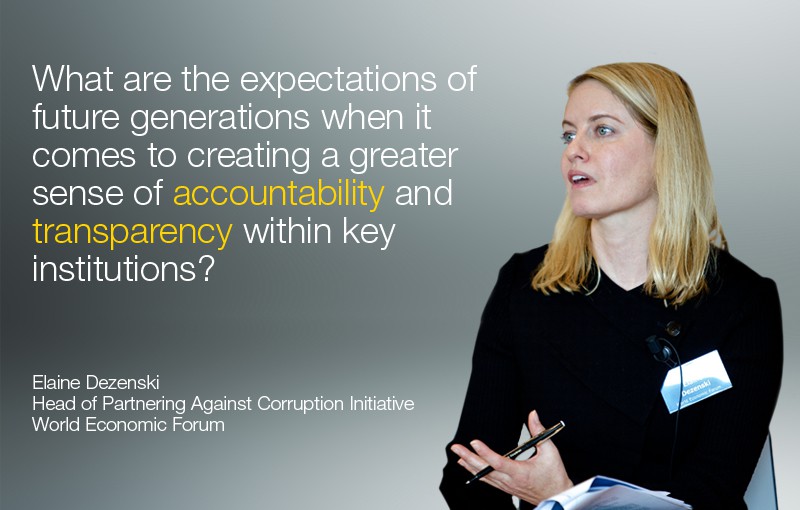4 ways young people can help fight corruption

Stay up to date:
Hyperconnectivity
Recent headlines from around the world are providing important reminders of the need to promote clean and transparent businesses, governments and societies. One of the most critical demographics in this conversation is the millennial generation, those who are just now entering the workforce and will begin to assume leadership positions over the next decade.
What are the expectations of future generations when it comes to creating a greater sense of accountability and transparency within key institutions? What do today’s leaders offer in terms of a model for those who will follow them? How can business leaders in particular harness youth interest as they seek to create the most competitive workforce for the future and position their organization as an employer of choice?
We were interested in exploring the view of those between the ages of 18 and 34 as part of a public-awareness campaign around our theme Designing Corruption Out of the System. Together with the UN Office on Drugs and Crime, Transparency International, the Accountability Lab and the International Student Festival in Trondheim, we surveyed millennial networks of our organizations to find out what they thought of the impact of corruption – how it affects their lives, their communities and how it may impact their future opportunities. The results provide a starting point to understanding the full scope of this generation’s perspectives on this issue and are worth examining, especially in the context of political, economic and societal shifts.
Our survey revealed that 72% of respondents believe that corruption is holding their country back and resulting in lost opportunities for their generation. This is particularly the case in the region of sub-Sahara Africa, 90% of respondents believe corruption is causing impediments to growth. These results echo the World Economic Forum’s Global Competitiveness Report 2014-2015, in which businesses from this region named corruption among the top hindrances. It is promising to see that both business and the next generation of its leaders are identifying the damage to be faced if corruption is not addressed.
So what can we do?
- Align global efforts for greater impact. More than 80% of millennials surveyed think the international community should pay a great deal more attention to the effects of corruption and its prevention and control. We agree. More alignment is needed across organizations, and the mandate includes the development of an anti-corruption agenda, along with support and partnership from institutions that feel the effects of corruption in their work (for example, development and humanitarian organizations). Alignment of agendas would help streamline resources, strategies and objectives towards impact, both globally and locally.
- Collaborate more deeply on high-priority objectives – and stick with them. Alignment would naturally lead to a prioritization of the most important actions that need to be undertaken. The important point is to go deep on the implementation of the most mission-critical recommendations. At the global level, recommendations developed through a multistakeholder process – for example, the G20/B20 – offer an agenda to which resources can be committed. This ensures that these dialogues actually have repeat customers.
- Hold one another accountable. The Forum’s PACI community comprises more than 100 CEO signatories who commit to zero tolerance against corruption in all its forms. This is no small commitment for complex, global companies, and few organizations are without challenges. The question is not whether an organization may discover a problem with corruption; rather, it’s how to respond when something goes awry. It takes leadership and patience to change an organization. But starting from within provides credibility and a foundation, by adopting strong compliance programmes and transparent supply chains, and engaging business partners to adopt similar standards. From this platform of commitment, companies can work together to enable more action; this in turn can create fairer market conditions, levelling the playing field and setting an example for others to follow.
- Address the tough issues. Corruption takes many forms. Increasingly, it provides less obvious ways and means of diverting resources from the system. While proposals to expose corruption-masking ownership structures are not without opposition, they should be pursued, along with other steps towards greater transparency. Leaders need to have an honest discussion about how to minimize the impact of corrupt practices on economic and political stability. Dialogue of this sort could help build much-needed trust among leaders from all sectors.
Finally, let’s not forget the views of the next generation. Systemic change takes time; whatever seeds can be planted now will eventually come to fruition, leaving something valuable for the next generation to cultivate even further.
The full results of the survey, The Impact of Corruption: Perspectives from Millennial Voices, are available here.
Author: Elaine Dezenski, Head of Partnering Against Corruption Initiative, World Economic Forum.
Image: A young man is silhouetted against the setting sun as he waits to sell green tea to customers along Karachi’s Clifton beach October 2, 2012. REUTERS/Athar Hussain
Don't miss any update on this topic
Create a free account and access your personalized content collection with our latest publications and analyses.
License and Republishing
World Economic Forum articles may be republished in accordance with the Creative Commons Attribution-NonCommercial-NoDerivatives 4.0 International Public License, and in accordance with our Terms of Use.
The views expressed in this article are those of the author alone and not the World Economic Forum.
Forum Stories newsletter
Bringing you weekly curated insights and analysis on the global issues that matter.

